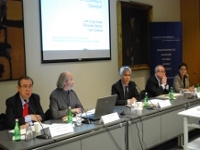Registration
You will receive an email confirming your registration.
IMGXYZ2398IMGZYXThe U.S.-Colombia Free Trade Agreement (FTA), which is awaiting approval by the U.S. Congress, would severely impact Colombian small farm producers and households, according to a new study commissioned by the Oxfam International. The study found that, under the existing trade framework, Colombian small farm producers and households—the population most affected by Colombia’s internal conflict— would respectively lose 16 percent and 10.5 percent of their income.
In an event jointly organized by the Carnegie Endowment, Inter-America Dialogue, and Oxfam America, Luis Jorge Garay and Fernando Barberi, two of the authors of the report, highlighted their findings. They were joined by Michael Shifter, vice president for policy at the Inter-American Dialogue, and Stephanie Burgos, a senior policy adviser at Oxfam America. Carnegie’s Eduardo Zepeda moderated the discussion.
Uneven negotiations
One of the chief arguments made in the study is that the agreed FTA framework is inequitable, and U.S. interests are favored over Colombian interests. Garay argued that the FTA negotiations did not take into account Colombia’s stages of development, poverty and inequality, and its economic and political constraints. Barberi pointed out several examples of the asymmetrical nature of the FTA:
- The United States is permitted to maintain its agricultural subsides, which give U.S. farmers an advantage in global trade, while Colombia is obliged to dismantle all domestic protections.
- While the United States exempted tariff on several items, Colombia was not allowed to have any exceptions to tariff elimination, including sugar. Colombia has a comparative advantage in sugar production. The United States gives subsidies to its sugar producers.
- Colombia must grant the United States the same preferential market access that it negotiates with any third country after February 2006. The United States need not reciprocate.
Given these asymmetries, Shifter questioned why, despite obvious losses for small farm households, the Colombian politicians would continue to support the FTA. He suggested an examination of the trade agreement in the long run, taking into account the potential impact on domestic conflict and terrorism, might show benefits to both Colombia and the United States.
Zepeda suggested that, if substantial asymmetries are common in bilateral trade negotiations, it might be beneficial for developing countries to seek multilateral trade agreements instead. Barberi agreed that multilateral agreements would give developing countries more power during trade negotiations, since they would be able to voice their concerns forcefully and collectively.
FTA impact on Colombia
The study suggested that the potential impact of the FTA on Colombian small farmers and households is substantial.
- Almost 400,000 small farm producers would see their income fall substantially. About 1.4 million small farm households would experience a fall in income.
- Prices of major crops such as corn, peas, vegetables and beans would decline. Furthermore, production of rice and wheat would also decline because prices of these items in Colombia will adjust with the prices in the United States, where the government gives subsidies to its farmers. Subsidies artificially lower prices.
Zepeda argued if the figures of the study are correct, then the scale of the impact on small farm economies in Colombia would call for a domestic policy response to address the concerns of the most vulnerable section of the population.
Julio Guzman of the Inter-American Development Bank (IADB) commented that a study done by IADB showed exactly opposite results, i.e. that small farmers and households would gain from the FTA. There is a need for a comprehensive study to explain the different outcomes of studies on the FTA, argued Zepeda.
